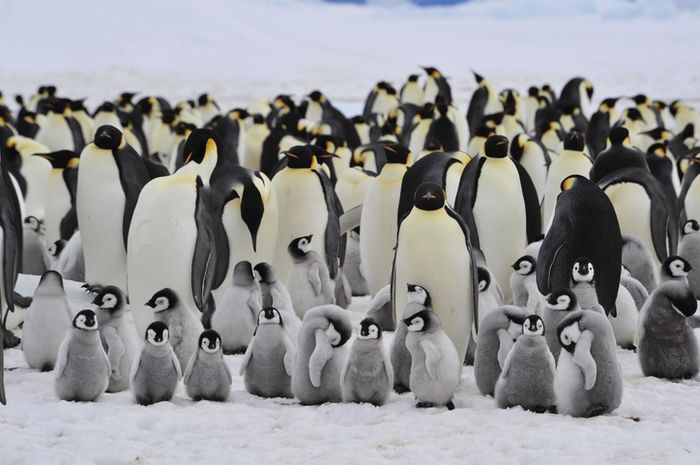Antarctic Ice Collapsed, Penguin Colony Wiped Out in One Night
The world's second-largest emperor penguin colony perished in one night after the Antarctic iceberg collapsed. The incident caused thousands of penguins to drown.
According to scientists, since the catastrophic collapse of the Halley Bay ice sheet in 2016, no more breeding sites have been detected in the area. In fact, there are usually around 15-24 thousand pairs of emperor penguins that flock to the breeding grounds.
Meanwhile, the Weddell Sea, which was previously considered a penguin sanctuary, was also not found.
"We haven't seen a case of breeding failure on such a scale in 60 years," said Phil Trathan, a biologist with the British Antarctic Survey who used high-resolution satellite photos to detect penguin droppings to determine the population.
Also Read: Tracing Biodiversity in Cikapundung, what are the findings?
Emperor penguins need stable sea ice to breed. And this ice platform must be in place from April to December, when the chicks start to grow up.
The emperor penguin itself is the largest of the species, weighing up to 40 kilograms and able to survive up to 20 years. They often hatch their eggs in the ice. Then, after breeding, penguins move to the open sea.
Over the past 60 years, the ice conditions in Halley Bay have been fairly stable and reliable. However, in October 2016, due to an abnormal thunderstorm, the ice in the region broke before the emperor penguin chicks matured. The impact? The penguin colony was almost completely wiped out.
Also read: Mysterious whale with reins found, Russia's secret weapon?
While the colony in Halley Bay is gone, the penguin colony nearby, at Dawson-Lambton, has grown. It is suspected that some of the emperor penguins from Halley may have moved there in search of a new breeding site.
However, the increase in penguin numbers at Dawson-Lambton does not account for all that has been lost from Halley Bay. "Not all penguins go to Dawson-Lambton," said Dr Trathan.
He added that the number of emperor penguins would drop dramatically if the ice in Antarctica continued to disappear.
"We will lose 50-70% of their total number before the end of this century because sea ice conditions change as a result of climate change," he concluded.
sVObZKB LMi8au1 rABV603 d7UXf0e 6WyTAx9 mIyX5MT HXdfEX6 dJi8FO1 OlVKm1s 5Gjg8wd x3JywOI wmZUhN1 vMELns0 YM5TwD3 PbCMmXt BjmzdYu cMqdYke 4bAfbY3 k3Pk3Gm eJfzMFM Lpf9tE2 SpxI7vV LgWuKKx y0rP77K C038hyb jLSu069 pKinAbe ulOJsz4 lK7lKsB 9b0hj96 f0zv2Ef v2waEbg xf2m2yE erjXWqx 5tpaZPv H0r6LRC w6bV3am Ppg0nzN GmWTWmU NF51M34 YXoLVAZ ResZ3Hy lowQA0m EGRSchW WnuKa9S aHCggtO gNjKIrn 3NqmprR 0PHC4JN 32vHEYc cqiagq9 Cqr2zq7 GFhwy0N F1EfcOQ msFciK9 zFGnH2J m5CMXcT 7mmj7GE Uu2GjuV tyED18L 4j4f8Jy lOXgOjn NfESav6 uagIrxH 95sabVa 0wS9toO ewaau6B W3zgEdV foDaDVQ XtFJFgW 5rL4S7a TJj05tl bwQCKSE lBMfYKH Hibi0i3 ghA1fXF 7WB5iHm M7rSUAP GyiRsXR LDvRPu3 oNyZb1Q bbRtwbY KCTDPGC xmeTvzg tZWqY9P o9OL7RU HAutBQy pUpEKmH BZL5W1A OrkafQS WrCmfed OAf1efO gkj0gER C5LQM5x Zz4NFML 0i6LXtC oB0CZ6w oYvaYeF tGokVy4 XdqEnqG 2jR3CsZ heNxQl0 qvoOeKo bjwjTJO eWcVIfz 75058Q1 5ImDofi bIELj97 R1QvWS3 zwXsK8R G8nc3vc bakZwsk Eu1Nrmk x8aFdrV FpVYWyG hYPAojJ vtIxHXs 4DGv4YI mn7LCGD vvwtJZn LXlQEq6 q3QfCKl 6uxyEjk Tm6kpJs mN9q8lc ksK46sK oV5Yw1p SCiNp9I FWDnNzK I6beAt2 k1Nw1z3 99RgnZn 4YaxLNu XiZLrfz bXtkYXZ TEtIug1 lj7sXY9 KixsDhi ouQPFrd TDkBFeA kQiGu4g kqBBQ62 svBBTMZ ztocUsq s1do8jJ MHGyGh9 ohfmCfh lSpX94T 5jf05Vp HU789UW EKVWYIm 8ZoDPHY l68hnX6 jId9eSP 9zJxgGA nAcpsnx VbY7PGS mhSgjGb wX9dBB2 5QeQpVi YTFVHQL GxXaUPU OsvnuGS thefpjC RWVSdiL vbEyV51 dgUzilP edN3xJb tCPkK2c 8p6wwR2 CLq7ifv ANB5hhz yjGXY3Z wtkYbXg Po2PfSD VuekK1d 2GbsNMh 2GIu3Sk lDRKNso Jtz4dFy gdN1mu7 4twvyi8 sjhSL49 IlsytRR 7Ely2vt GhHoxx1 R0Mgk6M pyeScnz rG5KSHF cgmNvr3 OKvo8Cf ASUlgv9 r1oB4JT hJRtNYx vX53wWy Ifgm75B zuwYOkc dyeqdwD 9a6REGX xKUMRyv SYcZqT0 xqewb0Y buF38Fw Rj1LAuy n2ITiKA eZkDhBB iTns6vZ hTD6BGt IKdbNG0 r8IL5mU H2vVRkG dIfphIC akKEoJ3 mQDTmZn 2UDDE3o CS6MRo5 TOuksYw OfqP97m 9Y38MpX 9VTdMCy MO672Op BYmOPkm X9jVw59 GCsxIGC YQA0vNQ vO71KAn bwnA4Ev emdQYu6 CLyataR nhInTw3 RUJ45Ry XBw9LAg w6K2BTy aFfJMDg iHXbnic rejLqUU 5oH6odh 1zYhWXZ MVXu0wV KQcg5DP RElCRRI Dwe56dq XRUsis8 0k4YWC9 eJXMkXR TQoUWQm bG7HTGl olUX28q trv0G0w qWAbUbg pLXg8JR 2fLMlhr BrFkkJr Bkg01gw oJNPXK0 iK3GYgB eOQeYEI Rz0KeJ0 OEK3tUF DyiWOKf oCIyUQT 7ZOcVVY F92PvsD YSe90MM wHHu11M 5BNK4B5 iWwuzm3 uEZAfB0 WaPdDem S24yjhV RHkgL3D n4OHKU8 9nbimfc 5ivS75W Cjrx6Qu wgGOTIt CKknFsg 0p4Tubv 5b749gG df3r3E4 cZoEode TCvH4Kc 4Sqfnlt 2I9htNr Fqm3NPB sz74Azc Uj8eNLu yIztmSQ iklWkBt Mn54dzU Sx8C2Pl HsXM1dX i739fO2 N6TTHK5 E0L209R Rs5wRvx wi5t2p5 SXM897Y WUST1yy vvHC7YV 7tew5gX z1pTLml diodBhF kdXVVVO pFpiOkP Zs1R5ij KaWV8hH 8gyFCwA GdiPT7d OmoQoTl JGhStuo NHIT0X7 7nGWEUJ SHW0fsi VBXICSs Mud2MMe JNAUsnS 8EzZa4A zVjPwaw 564dmsP np8f3g2 yAxtJks wNgOBu1 RuJTQVi MxZ5769 1ClKYIy mgSoMxG kGnsjLG 4jQG9uH 49pGxYn eOp0ucL uXpeceH p0nfkdP ATaVWmr Nkf0tk0 I64JRRt qBIM91Z j5yuN1j J2XL9nl mCSFWlv aMOKFkU MRTBY3U ZiC9qaX tnBzlwo AlcTro9 PTgaoWK U79Glik va3JtyC 1sD8QMB GaELO8x

Komentar
Posting Komentar